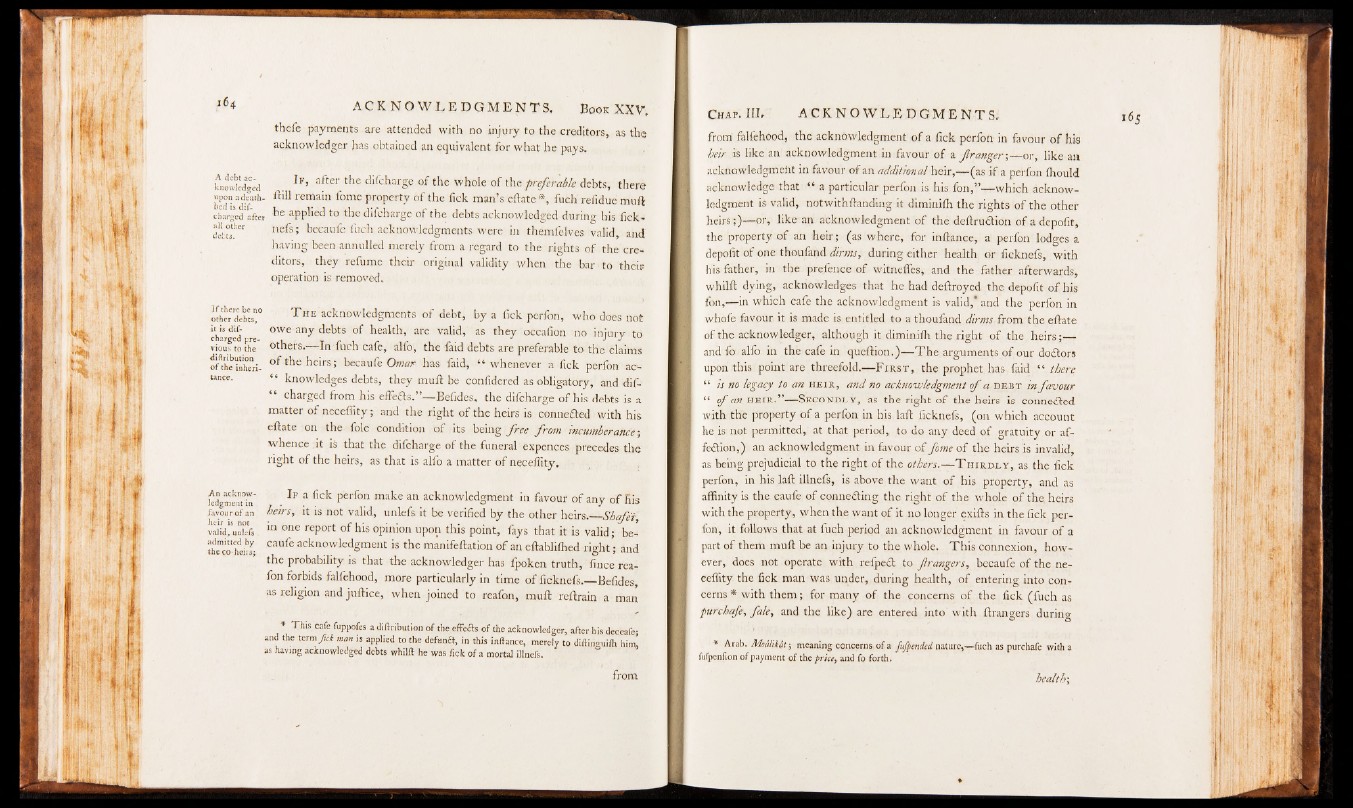
A C K N O W L E D G M E N T S ,
164
A debt acknowledged
upon a deathbed
is dif-
charged after
all other
debts.
I f there be no
other debts,
it is dif-
charged previous
to the
diftribution
o f the inheritance.
An acknowledgment
in
.favour o f an
heir is not
valid, unlefs -
admitted by
the co-heirs;
Book XX V ,
thefe payments are attended with no injury to the creditors, as the
acknowledger has obtained an equivalent for what he pays.
I f, after the difcharge of the whole of the preferable debts, there
Hill remain fome property of the fick man’ s eftate *, fuch refidue muft
be applied to the difcharge of the debts acknowledged during his fick-
nefs; becaufe iuch acknowledgments were in themfelves valid and
having been annulled merely from a regard to the rights of the creditors,
they refume their original validity when the bar to their
operation is removed.
T he acknowledgments of debt, by a lick perfon, who does not
owe any debts of health, are valid, as they occafion no injury to
others.—In fuch cafe, alfo, the faid debts are preferable to the Claims
of the heirs; becaufe Omar has faid, “ whenever a fick perfon ac-
“ knowledges debts, they muft be confidered as obligatory, and dif-
“ charged from his effeds.”—Befides, the difcharge of his debts is a
matter of neceffity; and the right of the heirs is conneded with his
eftate on the foie condition of its being free from incumberance;
whence .it ri that the difcharge of the funeral expences precedes the
right of the heirs, as that is alfo a matter of neceffity.
I f a lick perfon make an acknowledgment in favour of any of Eis
heirs, it is not valid, unlefs it be verified by the other heirs.— Shafei,
in one report of his opinion upon this point, fays that it is valid; becaufe
acknowledgment is the manifeftation o f an eftablilhed right’; and
the probability is that the acknowledger has fpoken truth, fince rea-
fon forbids falfehood, more particularly in time of ficknefs.— Befides,
as religion andjuftice, when joined to reafon, muft reftrain a man
* This cafe fuppofes a diftribution of the effects of the acknowledger, after his deceafe;
and the term fick man is applied to the defandt, in this inftance, merely to diftinguilh him!
as having acknowledged debts whiilt he was fick of a mortal illnefs.
from
T*
C hap. III. A C K N O W L E D G M E N T S ; 165
from falfehood, the acknowledgment of a lick perfon in favour of his
heir is like an acknowledgment in favour of a firanger-,— or, like an
acknowledgment in favour of an additional heir,— (as if a perfon Ihould
acknowledge that “ a particular perfon is his fon,”— which acknowledgment
is valid, notwithftanding it diminilh the rights of the other
heirs;)— or, like an acknowledgment of the deftrudion of a depofit,
the property of an heir; (as where, for inftance, a perfon lodges a
depofit of one thoufand dir ms, during either health or ficknefs, with
his father, in the prefence of witneffes, and the father afterwards,
whilft dying, acknowledges that he had deftroyed the depofit of his
fon,— in which cafe the acknowledgment is valid,* and the perfon in
whofe favour it is made is entitled to a thoufand dirms from the eftate
of the acknowledger, although it diminifti the right of the heirs;—
and fo alfo in the cafe in queftion.)— T h e arguments of our dodors
upon this point are threefold.— F i r s t , the prophet has faid “ there
“ is no legacy to an h e i r , and no acknowledgment o f a d e b t in favour
“ o f an h e i r . ” — S e c o n d l y , as the right of the heirs is conneded
with the property of a perfon in his laft ficknefs, (on which account
he is- not permitted, at that period, to do any deed of gratuity or af-
fedion,) an acknowledgment in favour of fome of the heirs is invalid,
as being prejudicial to the right of the others.— T h i r d l y , as the fick
perfon, in his laft illnefs, is above the want of his property, and as
affinity is the caufe of conneding the right of the whole of the, heirs
with the property, when the want of it no longer exifts in the fick perfon,
it follows that at fuch period an acknowledgment in favour of a
part of them muft be an injury to the whole. This connexion, however,
does not operate with refped to fir angers, becaufe of the ne-
eeffity the fick man was under, during health, of entering into concerns
* with them; for many of the concerns of the fick (fuch as
purchafe, fale, and the like) are entered into' with ftrangers during
* Arab. Moalikdt; meaning concerns of a fufpmded nature,—fuch as purchafe with a
fufpenfion of payment of the price, and fp forth.
health',